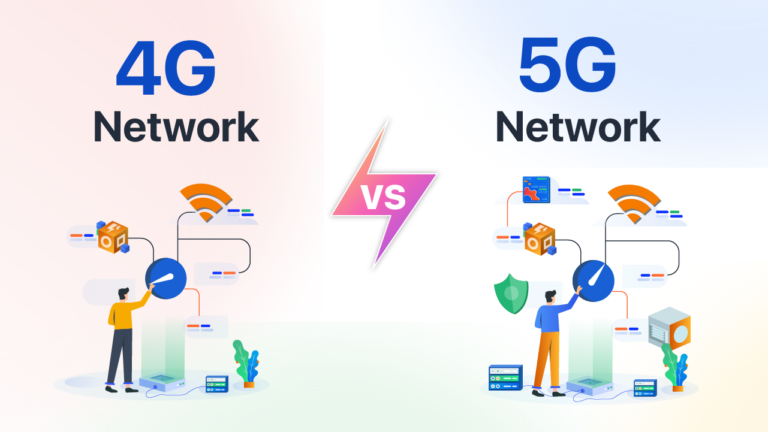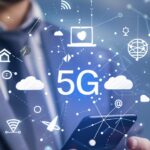5G vs. 4G. As the global rollout of 5G continues, many wonder: How much faster is 5G compared to 4G? The simple answer is that 5G offers dramatically improved speed, lower latency, and a host of other benefits. Let’s dive into the details of how 5G outshines 4G.
Key Differences Between 5G and 4G
Speed Comparison: 5G vs. 4G
5G is designed to be much faster than 4G. The potential speed increase is enormous, with estimates ranging up to 100 times faster. Here’s how they stack up:
| Feature | 4G | 5G |
|---|---|---|
| Download Speed | Up to 100 Mbps | Up to 10 Gbps |
| Upload Speed | Up to 50 Mbps | Up to 2 Gbps |
| Latency | 20-30 ms | 1-10 ms |
| Spectrum Range | Sub 6 GHz | Sub 6 GHz & mmWave (24-100 GHz) |
The real-world experience of 5G might not always reach the maximum theoretical speeds, but even in less-than-ideal conditions, it’s a significant upgrade over 4G.
Technology Behind the Speed
- 5G Spectrum: 5G uses higher frequency bands (millimeter waves), which allow more data to be transmitted simultaneously.
- Massive MIMO: 5G networks use many antennas to send and receive signals simultaneously, improving bandwidth.
- Network Slicing: 5G enables the creation of virtual networks for specific purposes, optimizing performance for different types of users and applications.
Key Advantages of 5G Over 4G
- Increased Speed: The most obvious benefit is speed. With 5G, downloads and uploads happen at lightning-fast rates.
- Low Latency: 5G has a latency as low as 1 millisecond, making real-time applications like remote surgery and autonomous driving possible.
- More Device Connections: 5G can support up to a million devices per square kilometer, compared to just a few thousand with 4G.
- Better Coverage and Efficiency: 5G networks handle congestion better, making performance more consistent in crowded areas.
Real-World Applications of 5G
The improved speed and low latency of 5G open up a host of new possibilities, including:
- Autonomous Vehicles: Faster, more reliable data transfer allows self-driving cars to communicate instantly.
- Smart Cities: With more connected devices and real-time data, 5G can help cities manage traffic, energy, and other systems more efficiently.
- Healthcare: 5G enables telemedicine, real-time monitoring, and even remote surgeries, where every millisecond counts.
Pros and Cons of 5G vs. 4G
| Pros | Cons |
|---|---|
| Faster Speeds: 10 to 100 times faster than 4G. | Infrastructure Requirements: Requires more antennas and small cells, which are expensive to deploy. |
| Low Latency: Crucial for real-time applications. | Coverage: Limited 5G coverage in rural areas initially. |
| Supports More Devices: Ideal for IoT, smart cities, and more. | Compatibility: Older devices are not 5G-compatible. |
| Energy Efficiency: Designed to consume less power than 4G. | Cost: 5G devices and data plans can be more expensive. |
Table: Pros and Cons at a Glance
| Feature | 5G | 4G |
|---|---|---|
| Speed | Up to 10 Gbps | Up to 100 Mbps |
| Latency | 1-10 ms | 20-30 ms |
| Device Support | 1 million/km² | Thousands/km² |
| Battery Efficiency | More efficient | Less efficient |
| Cost | Higher (initially) | Lower |
5G Deployment Challenges
Despite its benefits, 5G still faces challenges, especially in terms of infrastructure and accessibility. 5G requires more cell towers and antennas, which can be difficult and expensive to implement in rural areas. Additionally, 5G-enabled devices are typically more expensive than their 4G counterparts, though prices are expected to drop as the technology becomes more widespread. 5G vs. 4G.
How 5G Impacts Various Sectors
- Entertainment and Media: Faster download speeds mean high-definition movies and streaming content without buffering.
- Gaming: Low latency is a game-changer for real-time gaming and augmented reality (AR) experiences.
- Industrial Automation: Factories can use 5G to improve productivity through smart devices and instant data analysis.
- Telemedicine: Doctors can conduct real-time surgeries and consultations with specialists across the globe.
Table of Contents
FAQs
- How much faster is 5G compared to 4G?
5G can be up to 100 times faster than 4G, with maximum speeds reaching up to 10 Gbps. - What is the biggest advantage of 5G over 4G?
The biggest advantage is speed, but low latency and the ability to support more devices are also major benefits. - Does 5G use more data than 4G?
Yes, since 5G offers faster speeds, users are likely to consume more data, especially with streaming and downloading large files. - Is 5G available everywhere?
No, 5G is still being rolled out and is mainly available in urban areas. Full nationwide coverage may take a few more years. - Can I use 5G on my 4G phone?
No, 5G requires a compatible device. 4G phones cannot connect to 5G networks.
Conclusion
5G represents a massive leap forward compared to 4G. While it may take some time for 5G to become widely available, its benefits in terms of speed, latency, and connectivity will revolutionize many aspects of our lives. Whether it’s faster streaming, autonomous vehicles, or smart cities, 5G will play a crucial role in shaping the future of technology.


